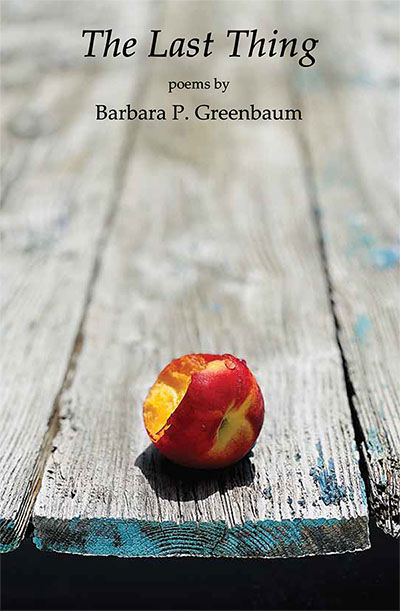The Last Thing
poems by
Barbara P. Greenbaum
ISBN: 978-1-59948-945-2, ~48 pages, $13 (+ shipping)
Release Date: November 16, 2022
The Advance Sale Discount on this item has expired. For those who prefer to pay by check, the price is $17/book (which includes shipping) and should be sent to: Main Street Rag, PO BOX 690100, Charlotte, NC 28227-7001.

Barbara P. Greenbaum has an MFA from the University of Southern Maine, Stonecoast. She taught creative writing at Arts at the Capitol Theater, a public magnet high school in Willimantic, Connecticut. Her work has been published in Arcturus, Clementine Unbound, The Lascaux Review, The Louisville Review, The Main Street Rag, and The Massachusetts Review, among many others. She often uses the pen name B. P. Greenbaum. A long time New Englander, she and her husband now live in Winston-Salem, NC.
Barbara Greenbaum is Everywoman, artful weaver of everyday stories that invite the reader to recognize our silent voices as we walk through the woods, as we interact with strangers, as we remember those we have lost. In what may be her most compelling piece, “Dancing with Daddy”, Barbara provides a lingering reminder of all that life has to offer – security, love, joy, and sadness. The beautiful, slow video continues to play long after reading. ~Steve R. Veilleux, author of Event Horizon
Barbara Greenbaum’s The Last Thing offers the reader a seat at the head of her finely-crafted table where she serves up a feast of memories. Savor these rich courses that are well-seasoned with life lessons of longing, of grief, and ultimately of hope. Greenbaum’s collection of poetry is so deliciously universal it will satisfy long after the last syllable is digested. ~ Victoria Nordlund
The Last Thing opens with two poems that declare the roles of fate and chance in living a life. Greenbaum then weaves moments and events into a surprising, intergenerational tapestry, specific in detail, closely observed and finely felt. It is impossible to read these poems without appreciating the connections the poet makes—intimate and far-reaching and heedless of Time’s chronology. Hers, a poetic feat rich and resonant with the vagaries of human possibility. ~Pit Pinegar
GUIDING LIGHT
My mother turns on her soap opera while I,
ten years old, snuggle deep in the red recliner
and watch my mom.
Her face smiles, sometimes giggles, a look
as if she’s surprised, lips slightly parting,
then, she’s fallen in love, a bit,
a frown, a downturn of phrase, a vocal tone.
She’s living it—there—beneath
where a truth can dwell, the swollen heart,
a knocking knee rounding the bend
of someone else’s story.
Every day at three we watch
handsome people conduct perfect conversations,
share imperfect secrets,
rustle their way through love, elation and loss.
Papa Bauer, oh how we miss you. Bert and Bill,
Mike and Ed, oh that wicked Roger. Oh, Riva!
Hope Bauer, weren’t you just a baby three months ago?
What a beautiful dress, she’d say and
he’s such a hunk, don’t you think?
And I there riveting on a twitch
in my mother’s blue eye,
a curve of lip, fingers to mouth,
telegraphs through our cells.
Tonight, I am there again watching a new story,
fingernails bitten, irises aligned with hers
all those years ago, and she is here
unmistakable, raising the edge of my brow,
tilting my spotted hand.
JUST LIKE THAT
It was dark when we moved to the farm.
My father drove the GMC pickup
pulling the two horse Rice trailer filled with boxes,
hay bales, my mother’s kitchen chairs,
and a black angus steer, a year old,
who never had a name.
As headlights lit the flat gravel drive,
my brother dropped the tail gate. Just like that
the steer slipped under the back chain
and walked out into the humid, mosquitoed air.
The night moonless, the steer black as pitch,
he looked at us, as if we were the stupid ones,
and ambled toward the black.
“Cut him off,” my dad shouted.
We all moved with outstretched arms,
but the steer bolted through our thin line
to become a shrinking speck in our vision,
a ghost across the field.
My father’s curses followed. My mother said
“Calm down, remember your heart,”
as if we could forget.
Weeks and sightings followed.
Mrs. Cheeseman brought us rhubarb pie.
George saw him yesterday on the far road,
as if we knew where that was.
At school, they snickered. Oh, you’re the ones,
the FFA girls said with their intimate bovine
understandings.
My father hired the cowboys.
They came with beaten leather chaps,
tan lined foreheads, bent elbows
and wrecked knees, listened to the story,
kept an eye out. So, when the steer
showed up in Licadello’s field,
a cowhand named Heath bulldogged him
from the back of a pickup.
The steer had grown bigger,
but too thin, feral, and angry to use.
My father gave him to the man
who caught him.
Find the steer, catch him and bring him home.
It was the first thing I remember that my father
couldn’t do, until four years later
when he couldn’t stay alive.
Just like that
as I watched my father die,
my childhood slipped its chain,
gave the place one last look
and trotted off into the darkness
beyond the tree lined borders
of our farm,
to become a ghost,
a shadow crossing a field.
DONE
Today
set up the tables
borrow a dress from Cindy
talk to the florist
pick out the serving bowls
find that pair of pearl earrings
call EJ, leave another message
tell him he has to come
call Whole Foods, order platters
one gluten free, one vegan – yuck
buy liquor
call the priest
pick out a hymn
find her rings
box things from the dresser
don’t look at them
lose the grocery list three times
buy the wrong size stockings
get too many oranges
too little coffee
lose the car keys
find the car keys
yell at the dog
hang up on EJ
make two martinis
drink them both,
slowly
list all your regrets
and some of hers
Tomorrow
get up
get out of bed
wash your face
blow dry your hair
put one foot down and then
the other
bury your mother
try to forget
everything else


